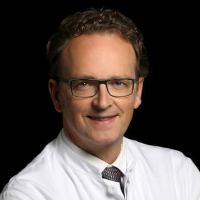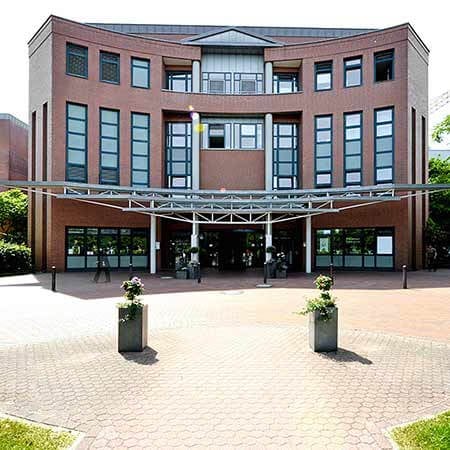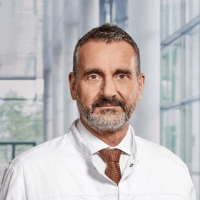Surgical Repair for Ventricular Septal Defect (VSD) in Germany
Treatment prices are regulated by national law of the corresponding countries, but can also include additional hospital coefficients. In order to receive the individual cost calculation, please send us the request and medical records.

Department of Cardiothoracic Surgery
According to the Focus magazine, the Department of Cardiothoracic Surgery ranks among the top German medical facilities specializing in the surgical treatment of diseases of the cardiovascular system and lung cancer! The department offers the full range of surgical services for the treatment of diseases of the cardiovascular system, respiratory tract, including heart and lung transplantation, artificial heart implantation. The therapeutic options include aortic surgery, coronary artery bypass grafting, transplantation surgery, surgical treatment of heart rhythm disorders (arrhythmias), minimally invasive surgery, surgical treatment of the heart valves, including reconstructive interventions. All operations are performed using state-of-the-art technology and in accordance with the current recommendations of professional societies.






Department of Cardiac Surgery
The Department of Cardiac Surgery provides a full range of surgical treatment in its area of specialization. Special emphasis is placed on heart valve repair and replacement surgery, coronary artery bypass grafting, thoracic aortic surgery, adult congenital and acquired heart disease surgery, pacemaker and defibrillator implantation, and artificial heart implantation for severe heart failure. Many heart operations are performed using minimally invasive techniques, which has a positive effect on the healing of the surgical wound. Minimally invasive cardiac procedures also reduce surgical risks and contribute to a rapid recovery of the patient in the postoperative period. Surgical treatment of cardiac pathologies is performed in advanced operating rooms equipped with the latest technology. The cardiac surgeons of the department successfully perform routine and complex surgical procedures, saving the lives of thousands of patients. The specialists work in accordance with current clinical protocols and follow the recommendations of the German Society for Thoracic and Cardiovascular Surgery (DGTHG).


Department of Cardiothoracic Surgery and Vascular Surgery
The Department of Cardiothoracic Surgery and Vascular Surgery provides effective surgical treatment for diseases of the heart, respiratory system, and blood vessels. The team of cardiac surgeons operates on patients with heart valve pathologies, coronary heart disease, heart failure, and heart rhythm disturbances. In the field of thoracic surgery, the key focus is on the surgical removal of lung tumors and lung metastases. The specialists in this area also perform surgery to repair chest wall deformities. In the field of vascular surgery, interventions for abdominal and thoracic aortic aneurysms are most often performed here. The department's vascular surgeons are also exceptionally competent in the treatment of peripheral occlusive arterial disease. A great advantage for the department's patients is that almost all surgical interventions are performed using minimally invasive techniques, so there is no need for a long postoperative recovery. The department's operating rooms are equipped with state-of-the-art technology. This allows for effective and safe treatment. The priority is always personalized medical care for patients.






Modern cardiosurgery successfully deals with most heart defects. A ventricular septal defect (VSD) is one of the most common congenital heart defects. Doctors in German hospitals use open surgery or a minimally invasive transcatheter procedure to eliminate it. With all the advances in interventional medicine, open surgery is still the most commonly used treatment for ventricular septal defects. If you need surgery, you can undergo your treatment at one of the German hospitals. You are welcome to use the Booking Health website to find out the cost of treatment, compare prices at different hospitals, and schedule an appointment on your preferred dates.
Content
- Who may need surgical repair for a ventricular septal defect?
- How is surgery for a ventricular septal defect performed?
- Why to undergo your treatment in Germany for a ventricular septal defect?
Who may need surgical repair for a ventricular septal defect?
Not all patients need treatment. If it is indicated, it is not always an open surgery.
Minor defects in the septum of the heart are usually not repaired. These disappear on their own over time. In addition, communications between small ventricles do not affect hemodynamics or cause any complications.
Indications for treatment are the following:
- prolapse of the aortic valve leaflets into a defect with the development of aortic insufficiency;
- an increase in the size of the left atrium and left ventricle;
- increased pressure in the pulmonary artery;
- the ratio of pulmonary to systemic blood flow (Qp/Qs) is 2 or more;
- signs of left ventricular dysfunction;
- the onset of symptoms;
- previous endocarditis.
It is desirable to eliminate heart defects at the age of 6-12 months (up to 18 months is acceptable as well). After this age, the treatment results are worse, since cardiac remodeling (restoration of the normal shape of the ventricles and atria) may be incomplete.
Medium and large heart defects require treatment. In the classic version, this is open surgery. In addition, modern medicine is becoming less traumatic, so minimally invasive procedures have been developed to implant an occluder in the heart defect area. Many modern hospitals in Germany practice these procedures, but they can only be performed for muscular and, in some cases, perimembranous defects.
Open surgery may be required in the following cases:
- complex anatomy of the heart defect;
- the location of the communication between the ventricles, which is inconvenient for implanting an occluder;
- combination of a ventricular septal defect with other heart defects;
- the development of complications that require surgical repair.
How is surgery for a ventricular septal defect performed?
The operation is performed on an open heart through an incision in the center of the chest using a heart-lung machine.
The method by which a doctor closes a ventricular septal defect depends on its number, type, and location. Minor defects are sutured, while large ones are closed with a patch from the patient's own pericardium or synthetic tissue. In some cases, the doctor has to form a new septum between the ventricles since it is actually missing.
The surgical repair of a ventricular septal defect is often performed simultaneously with the repair of other heart defects or manipulations aimed at eliminating the complications of an untimely repair of the defect. In some cases, the ventricular septal defect may be part of a complex heart disease, such as tetralogy of Fallot.
In addition, during the treatment of the ventricular septal defect, doctors often have to repair the aortic valve because many patients develop aortic insufficiency.
Why to undergo your treatment in Germany for a ventricular septal defect?
If you have a ventricular septal defect, you can be treated at one of the Cardiosurgery Centers in Germany. This is a country with advanced medical care. Even the most complex heart surgeries are successfully performed here.
There are a few reasons for you to undergo your surgical repair of a ventricular septal defect in a German Cardiosurgery Hospital. These are the following:
- successful elimination of even large septal defects;
- reliable treatment without a residual discharge of blood;
- elimination of not only a ventricular septal defect but the consequences of its long existence;
- successful treatment of concomitant heart defects in one operation;
- a low risk of complications;
- comprehensive medical care, symptomatic therapy, and rehabilitation after surgical repair.
You are welcome to visit the Booking Health website to find out the cost of treatment in Germany and choose a medical care program at the best price. On our website, you can find the leading Cardiosurgery Centers. When you make your treatment appointment through Booking Health, the cost of treatment in Germany is lower as compared to direct contact with the hospital. The price will be reduced due to the absence of additional taxes for foreign patients. The Booking Health specialists will select a hospital in Germany for you and help you with the organization of treatment for your ventricular septal defect.
Authors:
The article was edited by medical experts, board-certified doctors Dr. Nadezhda Ivanisova and Dr. Vadim Zhiliuk. For the treatment of the conditions referred to in the article, you must consult a doctor; the information in the article is not intended for self-medication!
Sources:
European Society of Cardiology

